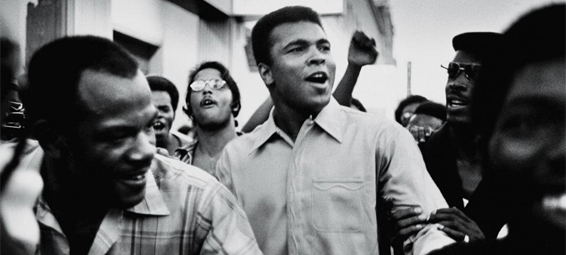Bill Siegel’s new documentary about the man who is often simply referred to as one of – if not the – greatest athlete of the 20th century begins by framing his life in brackets. The first shot shows Cassius Clay winning the Olympic gold medal in Rome in 1960; the second, Muhammad Ali being adorned with the Presidential Medal of Freedom by George Bush in 2005. The events consist of a similar action, but the man at their center has changed dramatically. The upstart is now a legend. His name has changed, and his once-spry body is now stricken with Parkinson’s Disease. Perhaps the most potent detail: Bush reaches out for Ali’s hand to greet him, which the great fighter keeps at his side. We think his hand is crippled with the disease, but it is not. Just a moment later, Ali raises that left hand to his new medal and touches it. The implication is that the president has just been snubbed by the man he is honoring.
Siegel’s introduction to Muhammad Ali deliberately takes up the triumphant images that have come to define our understanding of him in order to then suggest that in revering Ali today we forget that he was an outspoken, revolutionary, and hard charging political dissident. During that tumultuous decade that spanned the late 1960s and early 1970s, Ali evolved from fighter from Louisville to fervent follower of pioneering Islamic leader Muhammad Elijah. He became a traveling preacher and public personality, after his opposition to the war in Vietnam left him banned from the ring. The picture of Ali that emerges in the film is much more conflicted, nuanced, and caustic than the sanitized ideal that sometimes overtime can rebrand the reality of prominent personalities.
In short, The Trials of Muhammad Ali portrays the boxer as a young prophet. Through clips of speeches, interviews with subjects that include Ali’s former wife, his daughter, his brother, the last living member of the Louisville businessmen who backed him, sports writers, and others, we can feel the change in Clay that made him Ali. Perhaps most electric is the way Siegel has us re-experience Ali’s education, his early blustering jabber evolving into a nuanced, highly intelligent and disarmingly subtle torrent of anger and philosophy. Just watching Ali stone William F. Buckley on an old Firing Line clip had me running to the YouTube to dig up the full segment. Ali is infectious and magnanimous. It is difficult to watch the movie and not fall in love with him all over again.
But Siegel is not just building up Ali as hero, but suggesting that we have lost something about his history which made him truly heroic. The filmmaker situates Ali’s character in the complicated historical moment that birthed its particular blend of Civil Rights, Islamic fervor, racial exceptionalism, radical politics, and heightened self-awareness. His objection to Vietnam kick-started a multi-year legal battle that drove the case all the way to the Supreme Court. Meanwhile, Ali found himself an unwitting early spokesperson in opposition to the Vietnam War at a time when the full fervent of anti-war protests were only starting to matriculate on college campuses. As one sports writer puts it, the full extent of what Ali did with the example of his struggle was not felt until he finally returned to the ring in the early 1970s and defended his title. Suddenly the courage, tenacity, and boldness that had driven him through his out-of-the-ring travails were on full display within the context of the sport.
Siegel’s task is a difficult one. It is hard to accurate recreate with full complexity the times which helped ferment Ali’s particular personality, and at times the film reverts into the kind of one dimensional hero worship the filmmaker is trying to counteract. The film’s forays into the history of the Nation of Islam are muddled and incomplete; the dynamic between Malcolm X and Muhammad Elijah is touched upon, but it could be enough for its own documentary. But Siegel does succeed at resurrecting the spirit of a man. Ali fought hard for the freedom to be who he was, and this documentary allows him the dignity to be remembered as that tempestuous, tower figure.





